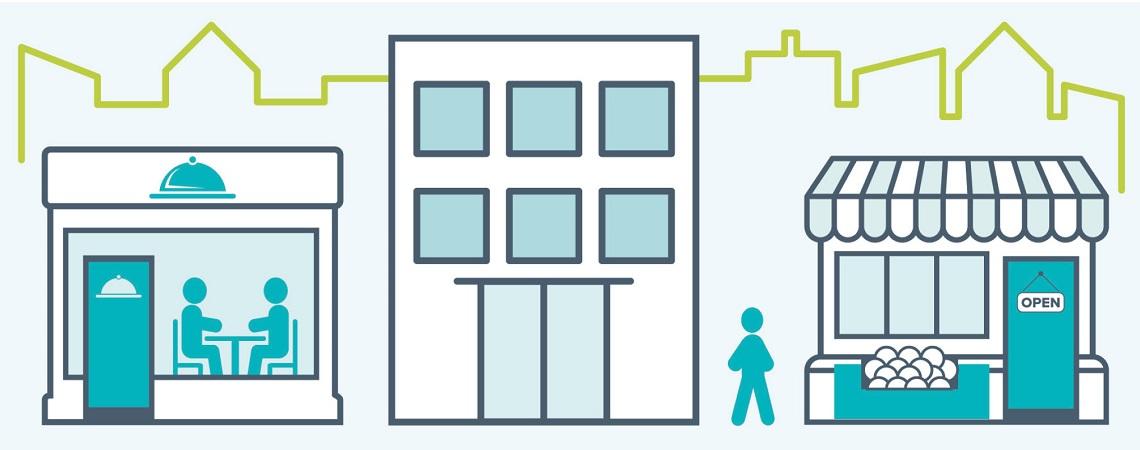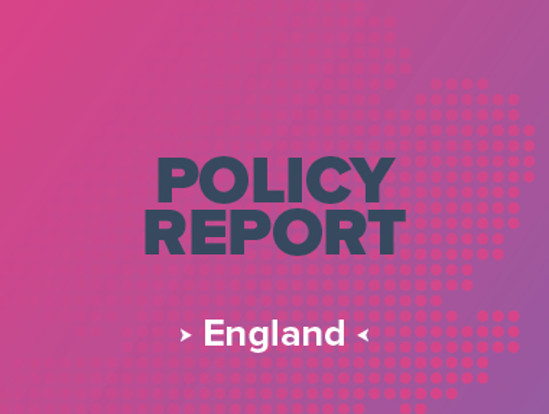Introduction
The past five years have seen substantial political and economic upheaval within Wales’ landscape culminating in one of the most significant challenges in generations for business owners in the guise of the ongoing Covid-19 pandemic and its effects.
The next five years must focus on how we can look to grow SMEs in Wales to recover and build economic development into everything we do in Wales for the long term, and on a sustainable basis.
Wales’ smaller businesses play an essential role in supporting local communities, creating wealth and employment, driving innovation and helping Wales adapt and respond to challenges. Covid-19, as well as being an unprecedented global pandemic global in effects, has also brought into stark relief the local value of services, amenities and economies, and the value of embedded local businesses as holding a vital stake – and as leaders – in their communities.
The 2022 local elections therefore come at a critical time where the role of ‘the local’ in politics has been amplified in importance, whether through Covid-19 business support delivery, through its approach to regulation and supporting businesses to help communities through tough times, or through the future shape of local economic development through the funding system post-Brexit. Small businesses are overwhelmingly local businesses, embedded in their communities, often fulfilling a leadership role, and with a real stake in the community. Local authorities make everyday decisions of vital importance to small businesses, whether through procurement, through towns and high street policy, regulatory measures or in maintaining and developing infrastructure.
Effective local government has never mattered more than now, when all levels of government need to harness and support local businesses to aid our communities’ recovery after the shocks of the last few years, and to build our local resilience to future shocks.
Local authorities need to work with other national, regional and local institutions and governments so that their departments are well resourced capacity is built so that local authorities can target areas of their own work and offer in building small sustainable businesses and to build local communities for the future.
Behind the proposals outlined in this manifesto lie an ambition to grow and develop an entrepreneurial Wales, protect and reinforce our communities, add value to the global mission – to be acted upon locally – of de carbonisation and help inform and develop a brand for Wales and its excellent local products and services which is internationally-ambitious and recognisable. This is an agenda which challenges all to engage and an agenda which recognises that whether a political decision maker or a business owner, Our Business is Wales… our business is local.
Our findings and recommendations
Click each section to discover what actions we recommend local authorities take to support small businesses and the self-employed in their area.
Local taxes and business rates

Local taxes in taxing times
Even in prosperous times, SMEs live on tight margins and increased costs will make businesses – and so local economies – more vulnerable. These factors are currently magnified by the impact of two years of the pandemic, and of spiralling energy costs, increases in National Insurance and the ongoing supply chain issues.
Local authorities face significant fiscal challenges, but it is vital that an analysis of local taxation consider the necessity for both Covid-19 recovery and long-term economic development for our communities when setting out their stall on taxes for businesses, and that taxes are viewed through a wider lens of economic strategy and not as revenue raising to fill funding gaps. FSB views any changes to tax system as needing to consider the primary principles of taxation to ensure that the system is fit for purpose:
- Fairness: each business should pay its fair share of taxes, and the rates paid should be similar to those conducting comparable activities. Equally, businesses should be receiving any reliefs they are entitled to
- Adequacy: the tax collected by government should be enough to cover government expenses on public services
- Simplicity: each taxpayer should have a clear understanding of the tax system, the taxes they need to pay, when their liabilities are due, and how much is due
- Transparency: taxpayers should have an understanding of how their tax payments are being used
- Administrative ease: the payment of tax liabilities should be a simple process that is not burdensome to either the taxpayer or the tax collector
- Neutrality: non-neutral taxation should only be due to a conscious and open policy choice to influence behaviour, rather than an unintended consequence.
Our recommendations
Keep business rates low. In our survey ahead of 2021 elections, business rates were the main key for businesses – and 99% thought action to alleviate these would have a positive impact on their business and the economy. In the face of spiralling business costs, energy costs and supply chain disruption, as well as a rise in National Insurance Contributions, reinstating the full business rates holiday as in 2021 – 22 is a key difference Welsh Government could make, and local authorities should support and press for this goal. Local authorities should also explore what discretionary reliefs they could apply on their own if Welsh Government do not retain the full holiday.
In the longer term, a recent Welsh Government report on towns noted that one means to encourage high street development would be to use them as economic zones with incentives to investment, including tax incentives such as no business rates in such key areas. FSB Wales would support this policy and encourage local authorities to look at how they could use it to promote and support local business activity.
Implementing the following would also be important:
- Keep lists and data up to date, including properties which qualify for Small Business Rates Relief. Good data is critically important for both the collection of rates and should grants be paid out to those in receipt of rates relief. Knowing who the business owner is, and how to contact them can be critical
- Encourage eligible businesses to apply for Small Business Rate Relief and other available reliefs
- Provide appropriate signposting support for any business looking to appeal against their valuation
- Support businesses to access any available discretionary reliefs they may be entitled to, including discretionary relief funds provided by the government
- Make transitional relief easy for businesses to apply for and administer swiftly.
Tourism tax. Tourism is overwhelmingly an SME driven industry, and small businesses and the tourism sector have been particularly hit during the Covid-19 pandemic.
Ensure a new tax is not in consideration for the immediate future Tourism tax has been a frequently discussed issue recently. At the outset FSB Wales would note that whatever the merits and demerits of any such tax, following successive ‘winter seasons’ since March 2020, this is not the time to raise the prospect of more costs and tax on a key Welsh industry that is particularly vulnerable at present. Given the need to have a ‘Welcome back to Wales’ message in order to secure a new tourist market for the future, it is also questionable that a focus on tourism tax is good for a key sector of the Welsh economy this year, and local authorities and councillors should state clearly that this is not on the horizon for the immediate future and support the industry to get back on its feet, as well as ensuring that Wales is clearly messaging that we welcome and value our visitors.
No ‘alfresco tax’. Local authorities and Town and Community councils were important in opening planning and use of outside spaces to help businesses when social distancing and table service restrictions made it difficult to conduct their business. All authorities and town and community councils should look to assess where these measures have been a success with a view to keeping the weighting in favour of opening spaces for use where possible (with adequate checks and balances to ensure safety and access and so on).
Unfortunately, some authorities have looked to raise money by raising a levy on the use of spaces. While a nominal fee can be defended (to ensure regulatory compliance, and to monitor its use, as well as to pay for some nominal costs to council), some councils have suggested a fee that is unreasonable, at a potential of cost of hundreds of pounds to each local business. This goes against the spirit of support to businesses to recover and appears to be aiming at filling in gaps from business rates reliefs made to provide for this business need at this time.
It is also important at a time where many people are still nervous, to view this as a means toward building consumer confidence in health and safety. For those who are vulnerable or remain nervous about socialising this opens these activities to them and helps them in the transition to fewer restrictions. It also increases the market of customers who would think twice otherwise. For these reasons, FSB Wales views any ‘alfresco tax’ as a mistake in driving for recovery.
Keep it simple. Tax compliance is a significant undertaking for small businesses, both in terms of time and cost. The average small business spends 52 hours a year completing their liabilities across taxation at a cost of £4,100. These are significant funds and time that could be better spent on more productive business activities, such as marketing and development, if the tax system and regulation was streamlined and simplified. Local authorities should look to ensure that tax and reliefs are easy to understand and administer for small businesses.
Work with UK and Welsh governments to build capacity and finding savings. The UK Government’s Levelling Up White Paper has identified the need to build different types of local capital (which it notes as physical, human, intangible, financial, social, and institutional capital) to succeed in driving long term economic development and in supporting businesses.
As things currently stand, local authorities often lack the capacity to provide the resources to deliver on this, with departments such as Economic Development, Procurement and Planning – all vital to small businesses – being particularly affected during the last decade. This ‘hollowing out’ of local authorities cannot be addressed by local authorities alone, and we need to understand these different strands of business support as forming part of a wider system. How local authorities interlink with Welsh and UK institutions, including arms-length institutions such as Business Wales and DBW are important. In accessing support and expertise at the regional and national level and building complementary skills within by this work, we can build on areas locally while making use of centralised expertise.
It also requires spending and funding of local government functions that sit above ‘local tax’, and for levelling up to work it is vital that Wales retain the level of funding prior to funding, but with greater flexibility to use it for strategic ends, and so increase the capacity to deliver on Economic Development, planning decisions, procurement.
Welsh towns and high streets

Looking to the future
Town centres and high streets across Wales are diverse, varying significantly by socio-economic makeup, sectoral breakdown and historical or natural qualities, as well is in their individual competitive advantages. A single prescriptive blueprint for success is therefore an impossible challenge. However, our diversity is our strength. Town centres and high streets can be beacons of character and creativity, of civic life and cohesion in a way that is unmatched by out-of-town developments. The place-making and strengthening potential of these spaces presents exciting social, economic, and environmental opportunities.
FSB Wales’ recent report ‘A Vision for Welsh Towns’ highlighted that only 3% of people feel that their local town centre is thriving. Nonetheless, there exists an immense passion across communities for these spaces, and a clear ambition to see improvements.
To shape their future, Welsh towns need help to create a bottom-up response. Working with Welsh Government and UK Government, local authorities should play their role by supporting every town in Wales create a clear Town Strategy for its future that encourages local people and businesses to shape strategy to fit what they view as their local area’s comparative advantages and particular needs.
Our recommendations
- Identify and list the biggest assets to the area, and how they can be used to improve the viability of these spaces. Efforts can be concentrated on identifying attractions and gaps in a way that assesses economic and social functions
- Seek to address and alleviate the immediate cost pressures that existing small retail businesses in town centres are enduring. This must include considerations around parking and direct business support
- Act as coordinators in identifying positive examples of Business Improvement Districts and disseminating these ways of working among existing or prospective BIDs. Analysis should be undertaken to understand how the activity of BIDs can effectively complement Local Authority provision in a way that maximises town centre viability
- Coordinate discussions – including with community and business groups, the police, and other key stakeholders – to identify trends of anti-social behaviour, and outline a cross-cutting strategy and action plan for prevention, monitoring, and enforcement to ensure that people feel safe and welcome in their town centre
- Working with BIDs, local authorities should outline measurable objectives and a set of clear metrics to monitor progress in the development of any town centre strategies. These objectives and metrics should be underpinned by cross-partner engagement and agreement to avoid competing or contradictory efforts
- Regularly publish and update a list of empty commercial properties. This should be complemented with initiatives to bring long-term empty commercial units back into use
- Commit to developing effective data-collection and monitoring infrastructure, used to inform on the efficacy of innovative interventions by decision makers and small businesses themselves
- Take a ‘No Town Left Behind’ approach to the digital transformation of town centres
- Commit to publishing the intake generated by car parking charges and dictate explicitly how such funds are being used to improve the area
- Make it easy for people to park by embracing new technologies, such as digital payments and accounts, while maintaining accessibility.
- Trial schemes designed to encourage customers to shop in small businesses on their high streets by giving parking discounts to those which do.
- Explore incentives to bring new footfall and promote local people to support business
- A small voucher (even as little as £5) to all local residents would serve a good purpose in nudging consumers to return to public life and spend in local businesses generally. It would itself serve as a signal from authorities that their support for local business is welcomed.
- Create a taskforce for rural Wales to examine issues facing rural businesses and deliver a firm set of policies, melding in the opportunities of remote working and regional town regeneration. Local authorities must work together with other levels of Government to shape business support to local needs and for long term economic development.
Business support and business engagement

Small businesses tell us constantly that the way they feel they are treated by local authorities and how welcoming its culture is can make a big difference to how they can engage. There needs to be an open business-friendly culture that recognises the role business plays in our communities and processes must be in place to ensure SMEs are given a level playing field.
We have noted in our recent ‘Building Businesses’ report that in supporting businesses to recovery that each level of government needs to build to its strengths. Central government can assist in providing financial firepower to build and ‘level up’, while local authorities are able to identify and address local market needs, build business networks, and engage with businesses on their needs in a way that central government cannot. It is important that we work to these strengths at each level, and mitigate against perverse outcomes, or incentives to pass unpopular costs onto different levels of taxation or look at new local taxes only through the prism of raising revenue to address gaps.
Support and engagement from local authorities is critical for small businesses to compete, grow and drive prosperity, jobs, and amenities in the local community. It is crucial for businesses to be able to communicate with local authorities when decisions are being made and access the services they need quickly and easily. For local authorities, understanding small business needs is key to driving economic development in the long term and ensure they conduct their business in a way that looks to grow a sustainable long term small business led recovery that benefits our communities.
Our recommendations
A small business engagement forum in each Local Authority. It’s vital that each Local Authority provides a forum for small businesses to regularly and meaningfully engage with local authorities and their policies, and that these forums are built into the system. Each Local Authority should have Business Engagement Forums as part of a wider business engagement strategy.
Keep it simple. Ensure consultations are simple, short, and easy to understand. This means making them accessible online and making local business and business groups aware of upcoming consultations.
Have a presence. Visit businesses. Face-to-face contact is important for building a trusting relationship with small businesses, and local business groups, fostering good long-term communication. Have a dedicated Councillor and Single Point of Contact acting as small business champions.
Work together. A rising tide lifts all ships. Talk to and share information with neighbouring local authorities. This means spotting opportunities for your SMEs to get involved in work or projects in neighbouring authorities and encouraging the diversification of ideas.
Build more local links into the workforce planning. Local authorities are local but can still seem remote from some communities. Following the Mollenwald model, local authorities should look at how new ways of working such as remote working can flip on its head the traditional model of a central HQ and ensure that there is a local link and point of contact for communities and local businesses across the whole authority where possible.
Value self-employment. At a time when the economy and business in Wales is subject to change and upheaval, the self-employed sector continues to be vital in local economies up and down Wales. However, it is a sector that is little understood and often ignored, including often during the Covid-19 pandemic. Local authorities should value self-employment by placing it on a strong footing within its economic development strategy. As our research has highlighted, individuals should be supported to go-solo.
Business support. Business support for Wales and the UK after Brexit is still in the process of being shaped and much is uncertain. Our recent report ‘Building Businesses’ has noted that effective business support requires each level of government to complement each other and to ensure that each play to their strengths. For local authorities this potential strength lies in creating business networks and engaging businesses, and identifying local market needs and trends as well as bringing in businesses to shape what would work for their communities for the long term. Local authorities should work with other levels of government to ensure they are able to access the financial firepower and policy expertise they need, particular in areas of economic development, procurement, and planning.
Local authorities are vital to the success of building businesses through better business support and should:
- Ensure that business support is accessible to all small business that need it, not just high growth, high potential firms
- Consider what support the Local Authority can offer to a business starting up, especially those would-be business owners currently working on ideas
- Work with partners such as Business Wales to streamline support services for business growth, so that there’s a clear point of entry for business looking for support
- Take steps to actively engage with hard-to-reach businesses and diverse groups including women and ethnic minorities
- Deliver any training and business support through multiple media channels seeking to maximise accessibility to all business owners, such as, webinars, podcasts, online training, events etc
- Consult with local business organisations like FSB to ensure that business support meets the above and to share data on business confidence, needs analysis etc
Work with the Development Bank of Wales and other institutions for a long-term outlook and to build capacity on business development and finance options. Since its institution during the previous Senedd term the Development Bank of Wales has made a significant positive impact, helping address gaps in access to finance and protecting business through the Covid-19 crisis. Following over a decade of austerity, Local authorities have capacity issues which are particularly felt in areas such as economic development and procurement teams that are vital to small businesses. Local authorities should look to use the expertise of regional and national bodies such as the DBW to provide independent and specialist support and advice on best practice on aspects of business support and finance, supplementing their own teams in these areas and facilitating learning across the institutions. This could build to give confidence to markets and businesses helping to facilitate policies to grow medium sized firms.
Local procurement

Doing business locally is often better value for money, and helps support small business in your area, which feeds back into the community.
Eighty per cent of small business contributed to the local community or charity in the past three years, with 38 per cent donating time, and 32 per cent contributing skills. For every £1 spent with SMEs in the local community, 63p is re-spent in their local area. Furthermore, pandemic, problems relating to Brexit and recent geopolitical tensions as a result of the conflict in Ukraine have all underscored the vulnerability of extended supply chains.
Local authorities have huge purchasing power which can be used to empower small businesses in your areas and help deliver for local communities. Building community wealth must also include building capacity and capabilities of small businesses to help build their competitiveness in the wider market.
Local authorities should also work with anchor institutions with purchasing power to build community wealth and local capacity and capabilities. The value of community wealth building procurement practices that do not exclude SMEs is well established and has been a policy for some time by government. Better delivery on this agenda and addressing the practical barriers to its use as full tool for local development is the real agenda, and local executives looking to how local authorities can do this better should be the focus over the next term.
An illustrative example of the rewards of overcoming the barriers, but also their persistence, is in the experience of Hywel Dda Health Board during the pandemic which dealt with challenges in supply of PPE by focusing on procuring from local suppliers. They utilised the South Wales Additive Rapid Manufacturing (‘SWARM’) originally set up by as a loose network of businesses with Swansea University, who then came together to help supply PPE.
As a result, equipment to a stringent and complex standard was sourced locally, as well as simpler things such as furniture. Support through the peer-to-peer networks helped bring products to strict standards, but also provided upskilling that could then be used in future. Costs locally were less high than anticipated, and any additional costs could be made up for by the fact they were quicker in turnaround. Local suppliers achieved the prices – or very near the prices – when aimed at. The experience points to the need to balance cost, with security of supply chains, as well as wider community benefits. Local authorities should work to bring together networks to build these sorts of options.
Our recommendations
Provide local procurement strategies with regular and consistent reporting on progress. Local authorities in Wales should be supported to drive and report on progress in areas including:
- Community benefit requirements in contracts
- Consulting and involving people affected local procurements
- Fair Work practices
- The procurement of fairly and ethically traded goods and services, including local food systems
- How procurement of food will improve the health, wellbeing and education of communities and promote the highest standards of animal welfare and ensure quality of local produce and the wider Welsh brand
- Requirement to pay invoices (or a similar claim) to contractors and subcontractors in 30 days or less
- How to take account of climate change and moving to a circular economy model in procurement activity
- Working with anchor institutions to facilitate procurement to build community wealth, and local SME capacities and capabilities
Build capacity and expertise. Procurement is a key area for local economic development but is an area that has been hollowed out within most local authorities’ departments. Local authorities should look to work with other levels of Government and expertise in other institutions to fill the gap, and a long-term strategy for building capacity and learning within their departments over the longer term. In this it serves a similar role as business support, and our recent report is available here.
- Ensure all contracts worth over £10,000 are published, following government regulations, and look to how to ensure fair competition and to help SMEs by publishing all contracts in a streamlined way.
- Have proportionate insurance requirements relative to the size of award, so as not to place unnecessary barriers in the way of small businesses.
- Pay invoices within 30 days as a minimum and ensure that these terms are passed down the supply chain.
- Use procurement power to deliver social value across local communities and invest in the local economy.
- Give timely and useful feedback to unsuccessful applicants – this could include three areas to improve.
- Adopt a “tell us once” system, where potential suppliers can bid for different contracts by passporting the same regularly used information across bids, such as accreditations.
- Replace framework agreements with Dynamic Purchasing systems.
- Regularly monitor spend with SMEs and payment performance, to ensure that targets and requirements are being met.
- Make it easier for small organisations to come together to bid in consortia or in partnership, through the provision of information and practical advice and building business networks and links with council, including working with the FSB.
Planning and regulation

Planning requirements and law are consistently identified by FSB members as a major barrier to their development, whether it is change of use, improvements to their premises, the creation of storage facilities, or availability of commercial premises.
Regulations are an important part of creating a stable business environment and a level playing field for businesses. They must be used in a way that promotes growth and fairness, and look toward supporting rather than being punitive, particularly when looking at SMEs who are time poor and capacity poor. Local authorities should think small first and work with businesses on how regulations should work.
Planning and regulations are vitally important to get right for sustainable development and doing so with a view to help shape markets and build the Welsh economy and workforce toward sustainable markets is important to future prosperity. Getting the balance right is key to future developments. Planning authorities must perform their services effectively, transparently and with clarity on decision making. It is vital that regulatory instruments to deal with flooding, environmental and safety are properly supervised and proportionate, ensuring that we do not get perverse outcomes and that they steer industry toward new opportunities.
It is vital that local authorities and planning authorities are well resourced enough to provide an efficient and effective service, and that inefficiency in the system do not lead to opportunity costs for economic development in the private sector and especially SMEs, which in the end only holds back Wales’ economic and environmental development.
Our recommendations
Capitalising on lessons learned. Recent changes in local planning in response to Covid-19 have introduced a paradigm shift, granting more flexibility to businesses, and enabling them to diversify their offering to local people, as well as providing for new engagement and understanding between businesses and local planning authorities. Local authorities should look to set these up on a permanent basis.
In addition, businesses should be supported and encouraged to utilise changes to Part 4 Class BB to use moveable strictures (gazebos) to benefit their business and enhance their offering to the public.
Local authorities should seek to ‘Embrace the alfresco’ and allow business to make the most of their outdoor space, where appropriate and process applications for change of use, improvements to premises and new developments at the earliest opportunity.
Planning for the future. Within local development plans ensure there is a range of affordable and flexible local business
premises available, both to encourage new enterprises and allow existing businesses to grow.
In addition, local authorities should improve the planning application process for small housing developments and work with small developers to maximise the Welsh Government’s ambition of building the necessary amount of new affordable homes and in encouraging increased investment to address the needs to modernise and retrofit the existing housing stock. Local authorities should work with Welsh and UK Governments to ensure that investment in additional housing promotes employment and training opportunities to build the capacity and capabilities of small developers for the future and support the Welsh economy moving forward.
Work with and encourage new entrants and landowners to release small pockets of developable land and look to incentives toward this end.
Cultivate co-working spaces. Investigate the feasibility of providing council managed office and light industrial space for businesses that offer easy in/easy out low rental agreements.
Look at opportunities by remote working council staff. During the Covid-19, Welsh firms have shown themselves able to adapt, and it is important that they are allowed the flexibility at how to take advantage of new ways of working and make agile working work for them in the long-term. Local authorities can be leaders in adopting remote working and should look at how this can be used to look at a new model for localised engagement. A disparate workforce working across the Local Authority can be used to the advantage of ensuring more local links with officials, rather than a single centralised office, particularly in rural areas. Councils should look to examples such as the Mollenwaard model which turns the typical local government model on its head. Rather than housing specialist civil servants at one central location and expecting citizens to travel, Molenwaard staff are spread throughout the district. Civil servants now visit citizens in their own villages bringing the city hall to them. This can also provide a clear and direct link to local business needs across wards throughout a Local Authority area.
Local authorities should continue to look at how the spaces their staff vacate can be used as hubs for businesses and respond to their needs.
Cut red tape. Adopt the British Columbia Model to reduce the overall regulatory burden by removing unnecessary requirements, by adopting a one in three out approach.
Adopt a support first, enforcement second approach across regulatory services. This should have a focus on reducing the regulatory burden. Local authorities and Business Wales should seek to minimise charging for accessing advice and support services. Preferably keep it free and available to all smaller businesses.
Co-ordination and consistency. Ensure effective co-ordination and consistency across all council regulatory services and neighbouring councils, including rationalising, simplifying, and speeding up Local Authority licensing applications and renewal processes and procedures.
Evidence based regulation geared to growing business. Develop case studies to demonstrate the benefit of regulatory services support to business growth and where changing regulations can provide incentives.
Retain a focus on every day and sustainable developments including highways. Recently planning departments have advised members that they will not have good service over the next 2 years, and that this is in part linked to capacity being used up for large capital projects. Large capital projects cannot be to the detriment of everyday services and developments that disproportionately impact SMEs. Speed up planning by reviewing the Planning Act (Wales) 2015. The planning system is important in achieving balance between development and the needs of local communities. However, as a process it’s significantly under-resourced, slow and fails to deal with the interest of smaller developers. The next Welsh Government should review the planning legislation in Wales with a view to creating a system that is proportionate and responds to the needs of SME developers.
The review should aim to speed up applications and reduce unnecessary costs on SME developers in Wales. This should include:
- Ensuring that costs, process, and timelines for decisions and planning process, with clear and transparent hypothecation of costs to established planning outcomes and system efficiency and effectiveness.
- Ensuring consultation responses are made within given timescales, in line with the requirements of the Planning Wales Act and ensure changes to any timelines are on a fair and proportionate basis.
- Build an open data infrastructure atlas for highways, utilities, drainage, water, and telecommunications, ensuring an open process and efficiency across different sectors.
- Explore how using Enterprise Zone style powers and incentives to develop high streets can be used through easing planning regulations as well as business rates tax reliefs. Look also in particular at ‘Hospitality Enterprise Zones’ in towns to promote recovery in this sector.
Work with the Future Generations Commissioner on local crisis planning for future shocks. The crises caused by Covid-19 has highlighted how fragile our economic environment is and how shocks that start in a public health sphere can quickly impact on the livelihoods of individuals and businesses across Wales. The Future Generations Commissioner has a clear role in considering Wales’ future wellbeing. Our proposed economic development Bill would take this further by giving it a statutory function to consider and review future threats to the Welsh economy and society of crises (whether health, environmental or economic) and ensure public bodies are adequately prepared for different scenarios, including the economic and business response.
Local authorities have a vital function in scenario planning in understanding their local markets, and any vulnerabilities, and should feed into any Economic Impact Assessments of the effectiveness of Covid-19 business interventions across the different stages of the pandemic to provide insight for responses in future and ensure the effectiveness of business support crisis delivery mechanism for the future.
Tourism and hospitality

Tourism and Hospitality are key industries for many parts of Wales, bringing a large number of jobs, and bringing in value to local communities, as well as being a key part of building the Welsh and local brands. This sector is overwhelmingly a local small business sector.
This is a sector that has been hit particularly hard by Covid-19 – with many usually busy seasons being like winter seasons – and a sector that still needs support to recover from the long-term effects, the lack of trade, costs of adaptation and accruement of debt during the pandemic.
While the trend toward ‘staycations’ has the potential to aid recovery and growth, it is also important that Wales and its SMEs are in a position to take advantage of any such boom, but also in a place to react to wider market changes and costs due to Brexit, and the general challenge of less disposable income being available to spend on breaks. As such, there should not be added costs to the sector in the immediate future and local authorities should signal their aims to support the industry in their economic strategy during a difficult time.
There is rightly a view that tourism needs to be built for sustainability over the longer term, and a need to look at how the value of tourism can be better shared among communities and businesses throughout the tourist areas and beyond, and we need to build these into the strategy for the longer term.
FSB Wales will be undertaking new work to outline its vision over the coming months and will look forward to working with local authorities and all levels of government on building a tourism vision and strategy that works best for Wales’ SMEs.
Our recommendations
Tourism taxes. As noted in the ‘local taxes’ section of this manifesto, tourism tax should be off the table in the short term while the industry recovers from the pandemic, and when it is vital to secure a new post-pandemic and post-Brexit customer base without such disincentives.
If any tax is to be enacted in future it should align with principles of good taxation beyond raising revenue for cash-strapped local authorities and should be hypothecated to spending that helps develop the industry, such as tourism services. There must be a thorough impact assessment based on our principles of good taxation on different models on how any tax raised (e.g., attractions, activities or accommodation).
Keep costs down where possible. Following the pandemic, many in the sector are in a vulnerable place, with ongoing rising costs adding to the uncertainty for the future. Local authorities should provide as much certainty as possible by committing to minimising costs on businesses where possible in the short term and avoiding any new costs (such as tourism tax or ‘alfresco tax’ on outdoor furniture).
Build skills, training and markets for a year around tourist industry. Skills shortages are a key issue for the industry following the pandemic which made employment uncertain due to regular lockdowns. Welsh Apprenticeships should look to build progressive careers in tourism with accreditation for key skills, and the Young Person’s Guarantee should look to build on such opportunities.
Training should look to make sure that skills built in tourism (customer care, marketing) are properly considered and valued, and that the skills and training system is used to build capacity and capabilities within firms on areas of vital importance (e.g., green skills, carbon auditing). All of these helps build SMEs for the transition to net-zero, but also to build substance to a Welsh ecotourism brand for the long term. This should be linked with shaping the market and industry to provide a year around offer of employment, but also economic strategy to build the tourist market across the whole year.
Schools, skills and training

Local Councillors and local authorities form a key interface in the skills support system in bringing together local business networks, skills practitioners, schools and further education institutions, and in delivering on the strategy to deliver on both individual and business needs, as well as ensuring we have the key capacity and capabilities to build our local economy. Local authorities need to focus on what they can do well to build SMEs access to, and understanding of, the skills system.
Local authorities and local councillors can also play a significant role in convening together community leaders (including employers), schools and colleges to ensure that we build young people’s experiences of professional work through learning and experience, and in building our entrepreneurs for the future.
Our 2017 report ‘A National Ambition’ found that SMEs overwhelmingly support the idea of employer engagement (85%). However, 54% had no existing links with schools. The new curriculum in Wales has placed more onus on schools locally to develop and a vital part of this for pupils’ experiences and learning is the use of community links to build from local strengths.
Local authorities and individual local councillors can make a real difference in using their convening power to bring businesses, education institutions and students together to provide for local success on these programmes and ensuring a solid experience of entrepreneurship and understanding of local markets as a part of the development of the new curriculum and ways of working.
Our recommendations
Bridging the gap between the training and education system and local SMEs. Local authorities have an important role in bridging between the education and training system and local businesses to ensure that we have a system that provides for skills development and filling in gaps for SMEs where they currently are particularly hard hit, ensuring the skills system works for everyone’s mutual interest, provides a meaningful offer for individuals and businesses, and helps work to Welsh Government’s aims and targets, such as the Young Person’s Guarantee being a meaningful offer of employment education or training in every part of Wales.
Work with other institutions and levels of government and business support. Business Wales and Local Authority business support need to work together to ensure that such advice is available and easily accessible, and local authorities should work to promote and build skills programmes with UK and Welsh Governments for businesses.
Local authorities should focus on their key strengths in engagement with local businesses and networks, in providing ways to build business networks and interfaces across the system and ensuring that information and support are easily accessible through the Local Authority, as well as feeding this information and local market needs to other regional, devolved and UK levels of the business support system.
Encourage better business links with schools. Building better and more productive links between businesses and schools will help both to prosper, to create a positive and consistent relationship between young people and the world of work. We think these links need to be turbo-charged by facilitating greater interaction between schools and their local SMEs. Local authorities and individual councillors can play a vital part in facilitating these links and networks and steering the process so that all schools benefit from the opportunities under the new curriculum.
Encourage Business Champions in every school. Alongside leadership role of headteachers, we suggest that institutional leadership should include a local small business representative on the school board with a remit to engage on this and provide a link between teachers and employers. Local authorities and councillors can encourage that schools take up this suggestion and encourage local business owners to take part and stand in school bodies.
Local authorities’ staff and councillors’ skills and training. While training and skills are vital to individuals and to businesses, it is also important that local authorities and councillors are open to training and awareness of how issues such as planning, regulation and procurement effect small businesses and economic development. Local authorities should look to provide councillors and staff on key committees on what a businessfriendly approach would look like, facilitating a pro-business culture in local authorities and more effective scrutiny and policy making.
Environment and Sustainability

Whilst small businesses have been asked to tackle many challenges over the decades, none are more threatening than the impact of climate change. However, in the face of many competing priorities, acting on sustainability is particularly challenging for small businesses, who often find themselves cash, resource, and time poor. Now, however, with increased levels of environmental awareness and the pressing need to reduce our impact on the environment before it’s too late, this is no longer a ‘nice to do’, but a ‘need to do’.
Local authorities have a key role in facilitating information and support for projects that support business in this transition – as the phrase goes ‘Think Global, Act Local’ – and local networks are vitally important to support business in exchanging information and expertise on making the transition to net-zero.
Recognising their role in combating climate change, small businesses themselves are already taking action to mitigate their impact on the environment. From the installation of basic measuressuch as LED lighting, through to becoming fully self-sufficient micro-generators, small businesses are as varied and as creative as ever in their drive to reach net zero. However, only 36% have a plan to combat their carbon impact. Small businesses want to do more and play their part, but they need help and guidance from their local authorities to do so.
Our recommendations
Deliver a net zero engagement plan. An engagement plan should target specific and important sectors in their areas with the relevant messaging about what net zero means for their sector, and how they can help reach net zero. Local authorities should also act as a point of contact and signposting for businesses wanting to find out more information about net zero. This could be supported by using FSB’s proposed Business Engagement Forums as a vehicle for co-ordinated and targeted conversations about and support toward moving to net zero.
Recycle, reuse, reduce. Local authorities should look to see how they might include commercial waste and recycling collection within existing services for the smallest of businesses. Small businesses should be allowed access to reuse and recycling centres – building on a permit scheme already in operation in some local authorities.
Local Infrastructure

Small businesses are embedded in their areas and so are less likely to move to agglomeration city areas where more has been spent on infrastructure. As such, like individuals in these communities, they are more reliant on the infrastructure systems, from broadband to public transport to ensure a level playing field across different sectors and to ensure that we have sustainable economic development and growth in every corner of Wales.
FSB Wales research in 2019 found that 63% of Welsh businesses have been affected by infrastructure including roads, public transport, digital infrastructure, and utilities. In terms of transport, overwhelmingly, the use of a car or van was very important to 89% of businesses, irrespective of where they were based in Wales.
According to small businesses, the top issues caused by infrastructure were increased costs, reduced profits, and fewer customers. Local authorities have a critical role in making sure that the voice of small business is heard in infrastructure discussions. It is in their nature to have a solid grasp of local issues and challenges affecting businesses on their patch.
Our recommendations
Routine engagement. Local authorities should commit to engaging routinely with small businesses to identify gaps in infrastructure, and escalate issues internally, as well as with Welsh and UK Governments.
Overarching vision. The development of overarching visions – including in the space of Net Zero – which would require a significant transition, must be underpinned by investment in necessary infrastructure. Local authorities should help to lead the way in demonstrating the scale of change necessary by making the right thing to do the easy thing to do. Strategically located electric vehicle charging infrastructure is one way that local authorities can ensure that the transition can occur.
Think small. Infrastructure should focus as much on local projects as on ‘big bang’ projects to promote wider sustainable growth.
Invest in our roads – and active travel. Local authorities should continue to see investment in roads – particularly local roads - as a priority, particularly looking to remove congestion and improve traffic flow. Investment in road and cycling infrastructure should go hand in hand, with road safety for cyclists being increased as investment is undertaken in roads.
Local authorities should also look to reduce public transport costs where possible to encourage necessary transition.
Creating a sustainable transport system. With firms looking at 5 – 10 years as a realistic time to move to EVs, there is opportunity to target a shift to electric vehicles for businesses within this timeline. Local authorities should work with UK and Welsh governments to incentivise this shift by introducing tax incentives or scrappage schemes as have happened previously and look at how to build local infrastructure that maximises benefits for our communities.
Optimising digital. 99% of business in Wales viewed the internet as important to their business, and this before the pandemic. Local authorities should provide local intelligence of business needs and gaps and should work with UK and Welsh Governments and mobile operators to expand the network coverage to ensure a level playing field in every part of Wales.
Future funding. Any regional funds replacing the current European funding should have a substantial proportion earmarked for local infrastructure projects.
Download the full report.
Cymraeg
Ein Busnes yw Cymru Mae’n Busnes yn Lleol
Y Deg Prif Beth y mae’r FSB yn gofyn amdanynt cyn Etholiadau Lleol yng Nghymru
Click below to download the full report including all references and further reading. You can also download FSB Wales' top ten asks ahead of Local Elections in Wales here.



